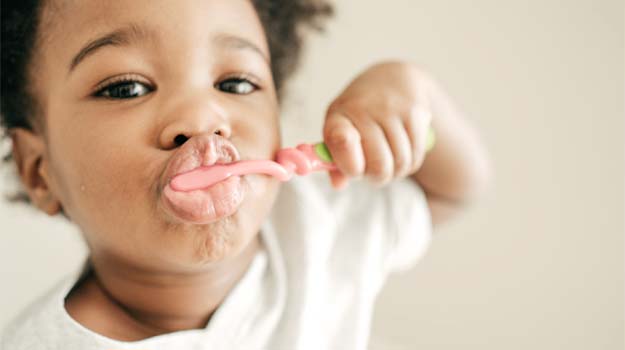How to Avoid Cavities in Babies and Toddlers' Teeth
11 Feb 2023 admin
There’s nothing cuter than seeing a young child with their first few teeth smiling proudly, but even though these baby or milk teeth only remain in place for a few years, they still need good oral care. Early childhood caries can quickly develop without proper dental care, which is a real problem for many infants and toddlers.
What Is Early Childhood Caries?
Early childhood caries is where one or more teeth have become decayed or must be extracted due to tooth decay or where a child under age 6 has fillings in one or more milk teeth. Anyone who has ever had a toothache will know that untreated tooth decay can be very painful, especially for a small child who may not be able to communicate their pain so easily to an adult. Without treatment, tooth decay can impact a child’s quality of life and development, affecting their ability to eat a wide range of nutritious foods and learning to talk clearly.
The good news is that tooth decay is a preventable condition. If you have a young infant or toddler, you can reduce the risk of cavities by following some simple steps.
Watch Their Sugar Consumption
Avoid giving your baby sweetened beverages like juice in their baby bottle or training cup. It’s also important to avoid giving them any sweet liquids in a night-time bottle, including formula and breastmilk. If they do want a night-time bottle, fill it with plain water. If your child likes to use a dummy, don’t dip it in anything sweet, like honey.
Aim To Stop Bottlefeeding by Age One
Aim to wean your baby off bottle-feeding by age one, as giving them bottles allows them to consume formula and other sweet drinks throughout the day. The longer your baby’s teeth are exposed to sugars, the greater the risk of early childhood caries.
Begin Regular Oral Care Early
Start cleaning your baby’s gums after each feed using a clean, damp washcloth or gauze. As soon as they start getting their teeth, you must brush them carefully with a soft baby toothbrush. At this stage, we can provide advice on which toothpaste to use and the amount. You only need a tiny smear at most, as very young children lack the ability to spit out excess toothpaste.
Establish a Routine of Regular Dental Visits
It’s a good idea to book your child’s first dental visit soon after they get their teeth. At this stage, they can have a ride in the dental chair, and we can gently check their teeth and jaws are developing properly. Our dental team can offer lots of useful advice on looking after their new teeth at home, including tips and tricks on cleaning teeth more effectively and comfortably for you both. We aim to make toothbrushing more fun and enjoyable! We can discuss when your child needs to begin seeing a dentist regularly. It’s also the ideal opportunity for your child to start getting used to regular dental care. We love seeing children and will ensure they feel safe and secure, creating a dental home for your child and establishing a relationship with them, helping them grow up with healthy, cavity-free teeth.
